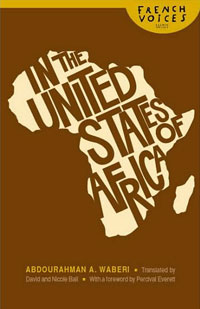By Ryan Michael Williams
In the alternate world of Abdourahman A. Waberi’s novel In the United States of Africa, Eritrea is a major financial center, and the space race was won by Madagascar. Desperate Caucasian refugees flee impoverished and war-torn states like Switzerland and Spain in the hope of finding new homes and better lives on the wealthy and culturally dominant African continent. Writing in French, Waberi—born in Djibouti, but a longtime resident of France—satirizes commonly-held assumptions about the global political and economic order by imagining what things might be like if Africa were to swap places with the West.
 Readers looking for an anti-Western polemic won’t find one here—Waberi’s inverted world is just as much of a mess as the real one, and suffers from similar kinds of conflict and exploitation. The Holocaust still happened, and the world’s poor still struggle desperately to get by. For Waberi, power is power, and he does not imagine for a moment that an African-dominated global political system would be any more equitable than one led by the West.
Readers looking for an anti-Western polemic won’t find one here—Waberi’s inverted world is just as much of a mess as the real one, and suffers from similar kinds of conflict and exploitation. The Holocaust still happened, and the world’s poor still struggle desperately to get by. For Waberi, power is power, and he does not imagine for a moment that an African-dominated global political system would be any more equitable than one led by the West.
All the same, Waberi’s outlook is far from grim. Throughout In The United States of Africa, he expresses a strong belief in the common humanity of everyone on Earth, and finds great hope in the power of art and storytelling to bridge divisions between nations, races, and classes. For Waberi, war and poverty are primarily matters of cultural misunderstanding, and might be altogether defeated if the powerful and powerless were better able to communicate with each other about their lives and stories.
Embodying this somewhat naïve hope is Malaïka, a young artist born in France, but adopted by a doctor in well-off Africa. In the United States of Africa follows the story of Malaïka’s African childhood and art school education, and then traces her journey to the impoverished and dangerous city of Paris on a quest to find her birth mother.
A child of both worlds, Malaïka serves Waberi primarily as a conduit for expressing thematic ideas about the cultural and political divide between Africa and the West. Although his discussions of her art and Parisian adventures are often compelling, Malaïka all the same never fully comes to life on the page.
But despite the fact that neither plot nor characters seem especially important to Waberi, his considerable ability as a stylist helps keep his novel consistently engaging. In David and Nicole Ball’s translation, Waberi’s prose reads as both riotously funny and lyrically lush, offering big laughs as well as multifaceted subtleties of expression.
Waberi revels in the plentiful opportunities for humor that his premise affords him. He often makes a sly joke in passing out of one of his adroit and imaginative cultural reversals: in his world, there’s an Arafat Peace Prize, and Miriam Makeba was the star of King Kong. His prose itself often indulges in a Rushdie-like playfulness, in which lighthearted verbal adventurousness combines with sharp observation to form winning punchlines.
Unlike Rushdie, Waberi also imbues his wordplay with a rich and sometimes startling sensuality. He treats the sex lives of his characters with frank eroticism, and often employs sexual metaphors in order to express other kinds of desire. He compares the lure of an open road to a seduction: “with bamboos, banyans…and crape myrtles from the West Indies swelling up on either side, this road is a siren lying on a bed of greenery. A terrible enchantress full of grace and cunning.”
Even a monument in need of restoration becomes embodied and eroticized as Waberi describes how Malaïka “admired its shapes and proportions” and went about “feeling and caressing it all over.” In another passage, Waberi delves into the horrors of sexual slavery with a frank and bracing profanity that effectively captures not only its fundamental ugliness, but also the sexual and economic allure it holds for its patrons and pimps.
The novel’s sensuality helps brings home its most compelling theme: the idea that while each human being is a unique, embodied individual, all humans are unified by the shared prospect of death. Waberi sees both political and personal exploitation as egregious violations of individual rights, and contends that exploitation of this sort would be far less likely to occur if the violators would only recognize the individuality, physical vulnerability, and common humanity of their victims. He opposes “domination” and “negation,” calling instead for, “Emulsion, fusion…Skin against skin, bodies in harmony.”
Ultimately, Waberi’s argument is not that power ought to be redistributed to Africa from the West, but instead that exploitation and violence will continue to plague the world as long as people fail to recognize their own fears and desires in the lives of others.
Ryan Michael Williams
Source: PopMatters
—————–
Ryan Michael Williams is a writer and librarian. His reviews have also appeared in The Quarterly Conversation, Rain Taxi, and ForeWord. He lives in Saint Paul, Minnesota, and blogs at http://goodreadings.wordpress.com.
We welcome the submission of all articles for possible publication on WardheerNews.com. WardheerNews will only consider articles sent exclusively. Please email your article today . Opinions expressed in this article are those of the author and do not necessarily reflect the views of WardheerNews.
WardheerNew’s tolerance platform is engaging with diversity of opinion, political ideology and self-expression. Tolerance is a necessary ingredient for creativity and civility.Tolerance fuels tenacity and audacity.
WardheerNews waxay tixgelin gaara siinaysaa maqaaladaha sida gaarka ah loogu soo diro ee aan lagu daabicin goobo kale. Maqaalkani wuxuu ka turjumayaa aragtida Qoraaga loomana fasiran karo tan WardheerNews.
Copyright © 2024 WardheerNews, All rights reserved


